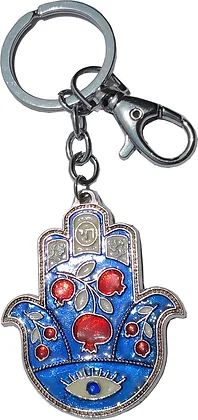
Preparing for the Ascent
When Rebbe Nachman taught this lesson, he himself was experiencing this level. His “head” was out of the water. Thus his manner was much gentler, and the Chassidim...

When Rebbe Nachman taught this lesson, he himself was experiencing this level. His “head” was out of the water. Thus his manner was much gentler, and the Chassidim who were there benefited from the lesson in a much more personal and comprehensible way.
Rebbe Nachman taught that in every situation in life, no matter how painful, some spark of goodness still exists; only it is momentarily hidden from our awareness. When we overcome our evil inclination, we cause the evil that conceals the good to fall away, so that only the letters of Torah in that situation remain. However, whereas the letters previously received just enough light to sustain them, so as not to allow any life-force to flow out to the surrounding darkness, they now receive much greater illumination.1
It is written in Likutey Moharan: “If a person can overcome his low desires, he causes the evil that conceals the good to dissipate and the letters of Torah to shine forth. Then he can perceive the words of Torah that were hidden in that situation. Thus, the Holy Zohar says that the verse, ‘Bless God, all His angels, mighty in strength to perform His word, to hear the voice of His word’ (Tehillim 103:20), refers to individuals who conquer their evil inclination and come to resemble angels.
They ‘perform His word,’ in order to ‘hear His word.’ By means of the good deeds they perform, they prepare themselves to receive Torah from above.”2
The word “strength” (koach), as in the verse, “Bless God, all His angels, mighty in strength to perform His word,” has the numerical value of twenty-eight. This alludes to those mighty souls who affirm their faith in God in all the twenty-eight periods of life: “A time to be born, a time to kill, a time to heal…” (Kohellet 3:1-8).3
When Yaakov was in the house of Lavan, he trusted in God and fulfilled His will no matter what happened to him. By doing so, he raised up many holy sparks that had been trapped there. However, when he left Charan to return to the Land of Israel, a few sparks still remained, and so Lavan had to chase after Yaakov, in order for him to completely remove all the sparks of holiness that were left behind. These last few sparks constitute the very verses in the Torah that describe Lavan’s pursuit of Yaakov and their subsequent struggle.4 Yaakov “performed God’s word,” in order to “hear God’s word.”
We see from this that the Torah insights a person receives are only in proportion to the preparation he makes. By clinging to God at all times, especially when apathy and confusion become overwhelming, a person imbues the Torah hidden in that trying situation with a brilliant new light. The insights revealed are the very words of Torah that his soul once heard at Mount Sinai, but now he has uncovered them through his own efforts.
From the Kingdom of Titus to the Kingdom of Heaven
Saw an amazing illustration of this idea in the name of the great Rabbi Meir Shapiro of Lublin zt”l. The verse says: “And it was when God caused me to stray from my father’s house…” (Bereishit 20:13)5. The Targum Unkelos translates this as: And it was, as the nations of the world strayed after their false gods, the works of their own hands, that God brought me away from my father’s house, to worship Him.” Rashi comments on this verse, "Unkelos translated it as he did.”
It is well known that Unkelos, Emperor Titus's nephew, converted to Judaism at about the time of the destruction of the Second Temple.6 Precisely at the time of great darkness for Israel, when there was every reason to err, God forbid, and eschew God’s people, Unkelos nevertheless decided to convert and take shelter “under the wings of the Shechinah.”
Rashi alludes to this by saying, “Unkelos translated it as he did.” That is, Unkelos translated the verse according to what he himself did. He came close to God in a time of darkness, when the nations of the world were straying after their false gods. His translation was a commentary on his own life. In other words, by performing God’s word, he came “to hear the voice of His word.” His own experience brought him to a deeper understanding of this verse in the Torah.
As a Deer Cries Out for Springs of Water
In a similar vein, I once heard a story about a certain author who requested an approbation for his book from the Divrei Chaim. The Sanzer Rav rarely gave approbations, but the author was very insistent, so the Rav took the book and leafed through it a little. As he did so, he came upon a discussion of a particular passage from Tehillim: “As the hart cries out for springs of water, so my soul cries out for you, O God” (Tehillim 42:2).
The author pointed out an apparent incongruity in the verse. Whereas the word “hart” is written in the masculine form, the verb “cries out” is written in the feminine form. After presenting several classic interpretations, the author offered his own unique solution to this problem. Chazal tell us that the hind has a narrow womb that makes it difficult for her to give birth. However, at the moment of birth, God sends a special type of snake to bite the opening of the womb so that it tears and widens. Thus the doe is born safely. This is as God said to Iyov (Job): “Do you know when the wild goats of the rock give birth, or can you mark when the hind's calf?” (Iyov (Job) 39:1). God alone watches over the birth of the doe.7 Chazal further state that the hind is the most compassionate of animals. In times of drought all the beasts of the forest come to her and ask her to pray on their behalf for mercy. She cries to God, and then leads them to springs of water from which they all drink.8
The author of the book asked a question: what if both these things happen simultaneously? While the hind is giving birth, the other animals beg her to pray for them. What does she do?
His answer: in that moment of crisis, the hind forgets her own pain and strengthens herself like a hart, a male deer who does not give birth, to cry out on behalf of her friends. Thus the verse says: “As the hart cries out for springs of water,” using both the masculine and feminine form.
The Sanzer Rav was so impressed by this explanation that he wrote an approbation. “If the author himself did not have this very spirit of self-sacrifice,” the Rav commented, “he could never have come up with such a unique explanation.”9
The Coin of Fire
The Chiddushei HaRim once told a story of a certain German Jewish community which was famous for its great love of the mitzvah of tzedaka. In the event of any local emergency, they were always ready to help, and would not rest until the person in trouble was back on his feet. Once, one of their Rabbis delivered a rousing speech about the importance of this mitzvah. He cited the Midrash stating that when God commanded the Children of Israel to donate a half-shekel, He showed Moshe a coin of fire.10 The Rabbi exclaimed, “God was telling them that they should give charity with burning enthusiasm!” When the Chidushei HaRim told this story to the Kotzker Rebbe, the latter commented, “Only because these people themselves are so enthusiastic about the mitzvah of tzedaka, were they worthy of such a brilliant insight. Especially in Germany, where they have a reputation of being somewhat cold and indifferent.” 11
We know that Rebbe Nachman always delivered his lessons in accordance with the spiritual insights he was experiencing at that moment. When he taught Lesson 25 in Likutey Moharan, which deals with spiritual enlightenment, he spoke with such fiery enthusiasm that he had to cover his face with a table napkin so as not to overwhelm the listeners, who were hardly able to look at him. The next day, however, he taught an entirely different lesson, based on Chazal’s words: “Rabbi Yochanan said, ‘I saw a fish who lifted its head out of the water, and its eyes seemed like two moons’”12 Rebbe Nachman explained that the fish represents supernal wisdom, his eyes shine like the sun. But when he removes his head from the water, that is, from contemplation on the Torah, his eyes shine like the moon.13 This is alluded to in the prayer: “If our eyes shone like the sun and the moon.”14 Sometimes they shine like the sun, sometimes like the moon. Occasionally, even a tzaddik must remove his thoughts from meditating on supernal wisdom, as Chazal say, “There are times when the cessation of learning Torah strengthens it.”15 Then, only an afterglow of the light lingers on in his consciousness, like the moon that merely reflects the rays of the sun.
When Rebbe Nachman taught this lesson, he himself was experiencing this level. His “head” was out of the water. Thus his manner was much gentler, and the Chassidim who were there benefited from the lesson in a much more personal and comprehensible way.
(Used with permission from the author, from "In all my Ways" Keren Ohr Publications).
1 Likutey Moharan I:56.
2 Likutey Moharan I:33, on Zohar 1:90a.
3 Ohr HaMeir, essay on Sefiras Ha’Omer.
4 Ibid. parashas Vayetze, in the name of the Maggid of Mezritch.
5And Avraham said [to Avimelech] : And it was, when God caused me to stray from my
father's house, that I said to her (Sarah), The kindness which you can show me; at every
place where we will come, say of me: He is my brother.
6 Gittin 56b.
7 Bava Basra 16a; Zohar 2:52b.
8 Midrash Tehilim 22; Zohar ibid.
9 See Sefer HaMidos: Tefilah 1. (English edition: The Aleph-Bet Book, Breslov Research Inst.)
10 Midrash Shocher Tov 91:1.
11 Emes v’Emunah p. 20.
12 Likutey Moharan I:16 on Bava Basra 74a.
13 Torah is likened to water, as the verse says, “For the earth will be filled with the knowledge of God, as the sea is covered with water” (Isaiah 11:9).
14 Nishmas Kol Chai, Shabbos and Yom Tov morning liturgy.
15 Menochos 99b.












Tell us what you think!
Thank you for your comment!
It will be published after approval by the Editor.